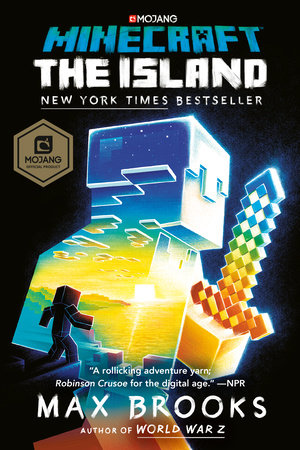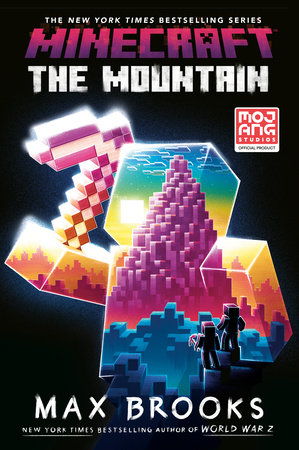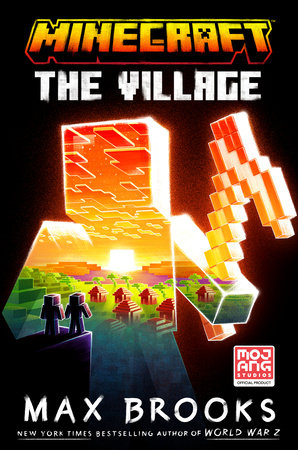Max Brooks Says Goodbye to Minecraft With The Village
by Laura Lambert
Starting with The Island in 2017, followed by The Mountain in 2021 and, this fall, The Village, best-selling author Max Brooks’ middle grade Minecraft series puts the younger reader squarely in the universe of the wildly popular video game, played by some 163 million people around the world. Not only does Brooks leverage a true fan’s knowledge of the game, he’s also a champion of what the game represents — a hero’s path for the creator, where “winning” isn’t so much about following the rules as it is about inventing your own future.
And he did it all for the kid he was at that age.
“I start out from the point of view of the kid who didn’t want to read, because that’s who I was,” says Brooks.
Brooks, who has dyslexia, did not read voluntarily until maybe 12 or 14 years old, when he picked up the obscure Marvel comic, Rom the Spaceknight. “I sat down and read the whole thing — the thick annual,” says Brooks. “And then it was like, Oh, I just read something.”
It was easy, he realized, because he was interested — and he’s leveraged that personal knowledge ever since.
Brightly hopped on Zoom with Brooks to talk about the art of reaching reluctant readers, so that they, too, can reap the life lessons in books like his latest, The Village.
Did you set out to crack the code for reluctant readers with your work?
My philosophy is you start with their interests, and find a book that fits.
And you are a Minecraft fan yourself?
The first time I played with my son, I thought, This is the most powerful potential teaching tool since the printing press. And I’m not being hyperbolic. It can wipe out the Prussian model of education that used to ruin outliers like me. That model of education is about standardization, regurgitation under the ticking clock.
In this era — and in a very broad view of this moment — kids are going to go back to becoming the entrepreneurs of the 19th century. They’ll have to solve problems their way. And Minecraft gives you that. You can fish, forage, hunt… however you want to do it. However, you want to grow your wheat or potatoes, you can. That brain training is going to help kids of the workforce of the 21st century.
And it’s a perfect model because the game is always changing.
What kind of books drew you in as a reluctant reader?
First it was picture books — comic books. And then it was audiobooks. I grew up with my mother (the actor Anne Bancroft) reading to me every night. When she had to go do a movie, she always made sure I had audiobooks. She went to the Braille Center, because she had studied there when she played Annie Sullivan in The Miracle Worker, and she knew them. She said, You read books for the blind. My son has horrible dyslexia, can you read for him?
Turns out I learned better through my ears and not my eyes.
That’s why I put as much effort into the audiobook as I do when I write the book.
What about your Minecraft books do you think draws in reluctant readers?
First of all, with a game like Minecraft, you’ve got to do your homework. I would play hours and hours of the game. So much of the action is the randomness of game play.
I’m coming from this idea that the writer is a tour guide for the reader. You have to know your stuff. And they need to know that I get it, that feeling of, Oh, that happened to me, too.
And then you have to have the right moments to infuse life lessons.
The first book is about how to live with yourself — patience and planning. The challenge was to find the moments when my character would learn how to recover from failure in the language of Minecraft.
In book two, he leaves the island. It’s all about friendship, finding the beat where two characters talk to each other and communicate and compromise, and how to work together.
And in book three, it’s the village. How do I teach kids the stuff they need to know for the times we’re living in now — why democracy is important, why money matters, why wars happen, what you need to do to survive all the modern things kids are living through now?
What will new readers of your work get out of The Village?
If they don’t know me, they don’t have to read The Island and The Mountain to read The Village. I‘ve done enough throwback to get people up to speed. Once again, coming from the reluctant reader, I make a point of saying, in the beginning, if you haven’t read the other, I’ll fill you.
What will longtime fans get out of The Village?
They’re getting the natural progression of this trilogy. It is the culmination of life lessons that Guy and Summer have learned separately and then together, the final step before they find what they’re looking for.
Are you sad to say goodbye?
I didn’t think I would get as emotional saying goodbye to them. But I’m indelibly attached to the soundtrack. This trilogy has had a theme song: Talking Heads, Once in a Lifetime. It will be hard for me to listen to any Talking Heads song without thinking of Guy and Summer. I love these two characters, their journey and what they’ve been finding along the way.
Part of the discipline of being a writer is to realize I’ve said what I had to say. In a way, it’s like letting your kids go. As painful as it is.
I have a high school senior. If you do your job right, they will leave you — as they should.
Do you have any advice for parents who want to raise kids who love to read?
When you’re reaching for a book for a kid, it’s not that hard if you get to know the kid. That’s all it takes.
And what you and I know is that reading is a discipline. Even if you’re good at it. It takes practice. I would say to a kid or a parent, it doesn’t matter what they’re reading. If you love Emily Bronte, read Bronte. If they love video games, get them reading the directions on the video games. Read, read, read, and develop those muscles — and they’ll get there.
This interview has been edited for length and clarity.
-
Get the Books:



